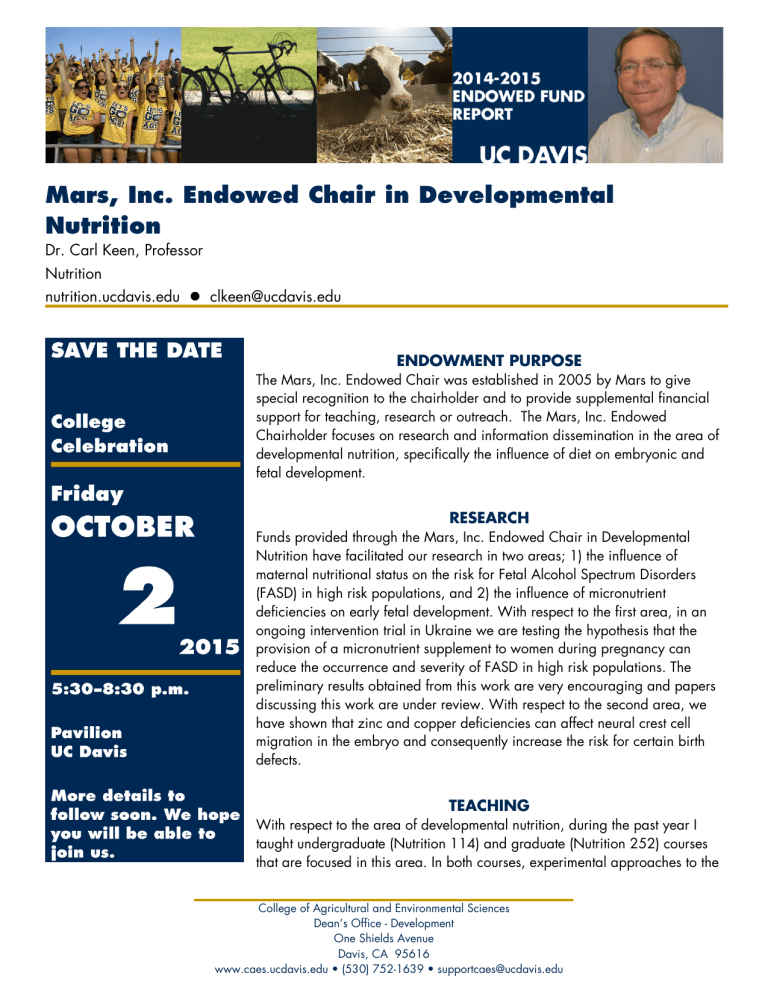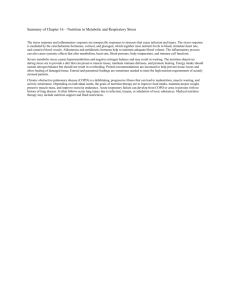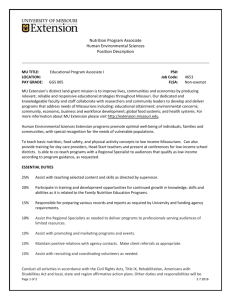Mars, Inc. Endowed Chair in Developmental Nutrition

Mars, Inc. Endowed Chair in Developmental
Nutrition
Dr. Carl Keen, Professor
Nutrition nutrition.ucdavis.edu
clkeen@ucdavis.edu
ENDOWMENT PURPOSE
The Mars, Inc. Endowed Chair was established in 2005 by Mars to give special recognition to the chairholder and to provide supplemental financial support for teaching, research or outreach. The Mars, Inc. Endowed
Chairholder focuses on research and information dissemination in the area of developmental nutrition, specifically the influence of diet on embryonic and fetal development.
RESEARCH
Funds provided through the Mars, Inc. Endowed Chair in Developmental
Nutrition have facilitated our research in two areas; 1) the influence of maternal nutritional status on the risk for Fetal Alcohol Spectrum Disorders
(FASD) in high risk populations, and 2) the influence of micronutrient deficiencies on early fetal development. With respect to the first area, in an ongoing intervention trial in Ukraine we are testing the hypothesis that the provision of a micronutrient supplement to women during pregnancy can reduce the occurrence and severity of FASD in high risk populations. The preliminary results obtained from this work are very encouraging and papers discussing this work are under review. With respect to the second area, we have shown that zinc and copper deficiencies can affect neural crest cell migration in the embryo and consequently increase the risk for certain birth defects.
TEACHING
With respect to the area of developmental nutrition, during the past year I taught undergraduate (Nutrition 114) and graduate (Nutrition 252) courses that are focused in this area. In both courses, experimental approaches to the
College of Agricultural and Environmental Sciences
Dean’s Office - Development
One Shields Avenue
Davis, CA 95616
www.caes.ucdavis.edu • (530) 752-1639 • supportcaes@ucdavis.edu
College of Agricultural and Environmental Sciences
2014-2015 Endowed Fund Report
Page 2 study of the causes of birth defects, and their prevention, are taught. Results from our ongoing studies in the area of FASD, and the developmental consequences of micronutrient deficiencies, were used to provide real life examples for the students. Complementing the above, in a Graduate Seminar course I organize (Nutrition 291), several seminars in the area of Developmental Nutrition were provided.
STUDENTS
Funds provided by the endowment were used in part to support the research activities of two current PhD students, Ms. Krista Sowell and Mr. Harprett Chima. The above students are critical members of the team working on the Ukraine FASD project. A Master's student in our group (Ms. Lyudmyla Demyan) also received funding from the endowment in support of her work on the influence of copper deficiency on early embryonic development.
OUTREACH
Funds from the endowment helped to support my outreach efforts in the area of developmental nutrition.
Significantly, these funds helped to support a student educational workshop I participated in at the 2014
American Teratology Society meeting.
NEW AND UNIQUE ENDOWMENT USE
Funds provided through the endowment are being used to obtain novel data on the influence of maternal nutritional supplementation on the severity of FASD associated immune and behavioral deficits in children with
FASD. It is hoped that that work will lead to new insights to the treatment of these children.
LEVERAGING ADDITIONAL FUNDING
We currently have two grants under review at the NIH which are based in part on the preliminary data that has been collected from studies supported by the endowment.
THANKS
The work that has been supported by the Mars, Inc. Endowed Chair in Developmental Nutrition has significantly contributed to our understanding of the causes, and potential treatment, of FASD. The role Mars, Inc. has played in the prevention and treatment of this far too common birth defect cannot be overstated.
College of Agricultural and Environmental Sciences
Dean’s Office - Development
One Shields Avenue
Davis, CA 95616
www.caes.ucdavis.edu • (530) 752-1639 • supportcaes@ucdavis.edu








